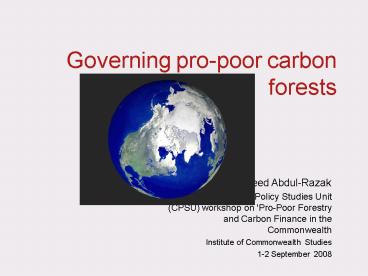Governing propoor carbon forests - PowerPoint PPT Presentation
1 / 18
Title:
Governing propoor carbon forests
Description:
Noel Kempff Climate Action Project. One of the largest pilot projects undertaken globally. ... Nacional de France, ONF Brasil, IPN= Instituto pronatura, SC ... – PowerPoint PPT presentation
Number of Views:57
Avg rating:3.0/5.0
Title: Governing propoor carbon forests
1
Governing pro-poor carbon forests
- Emily Boyd and Saeed Abdul-Razak
- Commonwealth Policy Studies Unit (CPSU) workshop
on 'Pro-Poor Forestry and Carbon Finance in the
Commonwealth - Institute of Commonwealth Studies
- 1-2 September 2008
2
Overview
- Features of carbon (forest) governance
- The early debates around equity and forest carbon
- Lessons learned from two pilot projects
- Status of REDD, governing Redd for the poor
3
Features of carbon (forest) governance - who
governs and at what scale?
- New actors
- Actors beyond the state, civil society and
private actors, new cultures, rules, processes,
power, science/knowledge-policy interface etc
(Kjaer, 2004). - New governance networks flows of resources
international, national and local - Decision-making at difference scales has
management implications for the commons (Young,
Berkes, Folke) - New values and priorities
- nature gains new commodity value
4
International carbon forest instruments (CDM,
VCO, REDD)
- Kyoto Protocol, 15-20 CO2 emissions from
LULUCF, part of global carbon market - Financial incentives, flexibility, etc.
- Coupling forests, poverty alleviation, consumers
CDM UN accedited projects include afforestation
and reforestation
VCO Voluntary carbon market includes forest
management and Conservation activities
REDD Proposals include project based activities,
e.g. World Bank forest carbon partnership,
Australias International carbon forest
initiative
5
State, market, civil society perspectives on
clean development
6
Equity perspective Development ethics
- Popular discourse
- 1. Instigated by companies or governments
- 2. Landless (indigenous communities) fall outside
- 3. Absence of local understanding
- 4. Degraded assumed
- 5. Monitoring and technical costs
- 6. Biophysical system unknown
- 7. Objectives unclear
- 8. Local movements against plantations
- 9. Acquiring land grievances
- 10. Small lacks credibility/ large scale no SD
- Underpinning debate
- 1. Green revolution - modernisation and
dependency - 2. Conservation and development failure
- 3. Large-scale infrastructure (Dams)
7
Pilot Projects
8
Noel Kempff Climate Action Project
- One of the largest pilot projects undertaken
globally.. TNC, a consortium of companies (AEP)
and the Bolivian Government. - Emission avoidance project
- Deforestation is avoided through indemnified
logging concessions complemented by diminished
agriculture encroachment on purchased land. - NKM National Park doubled in size with the
project to 1,523,446 ha. - Carbon generation is estimated at 7 m t/C over 30
years.
9
Key local impacts
10
Local perspective
- Because everyone was not in agreement with
the expansion of the park the community didnt
view the people responsible for the program with
appreciation, they rejected them. So, we lost two
years in all this ignorance, in trying to throw
away the help that came to us for a project to
have success it should be done in a participatory
way, so that when it comes to project
implementation, everyone is in agreement,
everybody knows and in this way work with
responsibility and dedication. I see it as a
lesson learned from now on forward we have to
take into consideration these things (President
of CIBAPA, pers. comm., Bajo Paragua, 2001).
11
Cross-scale interplay and institutional dynamics
in the NKMCAP
12
Peugeot/ONF project
- To seek environmentally friendly image to counter
the image of emission intensive car
manufacturers. - Partnership with ONF, and IPN
- Arc of Deforestation of the Amazon basin
- US 12 M investment
- Initial target 10 M native trees on 5,000 ha.
- 7,34 M tons CO2 over 40 years
- Original carbon estimation reduced to 500.000 t/C
over 100 years, on 2,000 ha.
(Grist, 2000)
13
Peugeot Key Findings
- Local benefits jobs, multipurpose tree planting,
educational activities - Conflicts centralized decisions, foreign
control, breach of national legislation - Outcomes restructuring
(Pronatura, 2003)
14
(No Transcript)
15
Summary
- At the national and international
- Decision-making about carbon forests largely
expert driven and state centric - Raises questions about when there are multiple
priorities which agenda and rules dominate? - Consequences for social development, norms, and
institutions? - At the local - lessons show that
- Good intentions are not enough
- Development aspects weak
- Problem of fit
- Local politics overriding
- Boyd, E. 2007. ESP
- Boyd, E. 2006. GEC
- Boyd, E. 2006. MEA
16
Status of REDD discussions
- UNFCCC Accra outcomes
- On the road to Poznan
- Initiatives
- Australia US200 million International Forest
Carbon Initiative - World Bank Forest Carbon Partnership Facility (14
projects, Ghana)
17
Preliminary findings on pro-poor Redd governance
in Ghana
- Ghana - Redd credits from 30 to 346 million per
year (Mongabay, 2008) - Four key local/national governance challenges
identified - Perspectives
- Knowledge
- Institutional
- Implementation
18
Conclusions
- What can we take from lessons and apply to REDD?
- Governing Redd for local communities should
reflect understanding and factor in - Local equity development concerns (e.g. via
NGO, local representation) - National capacity on Redd (DNA)
- Formal and informal governance networks, e.g.
scientific and local expertise, capacity for
learning - Local knowledge, historical, localities, power
dynamics, social memory (baselines)
















![Activated Carbon Market Size, Share & Growth [2016-2021] PowerPoint PPT Presentation](https://s3.amazonaws.com/images.powershow.com/9404136.th0.jpg?_=20200225035)














